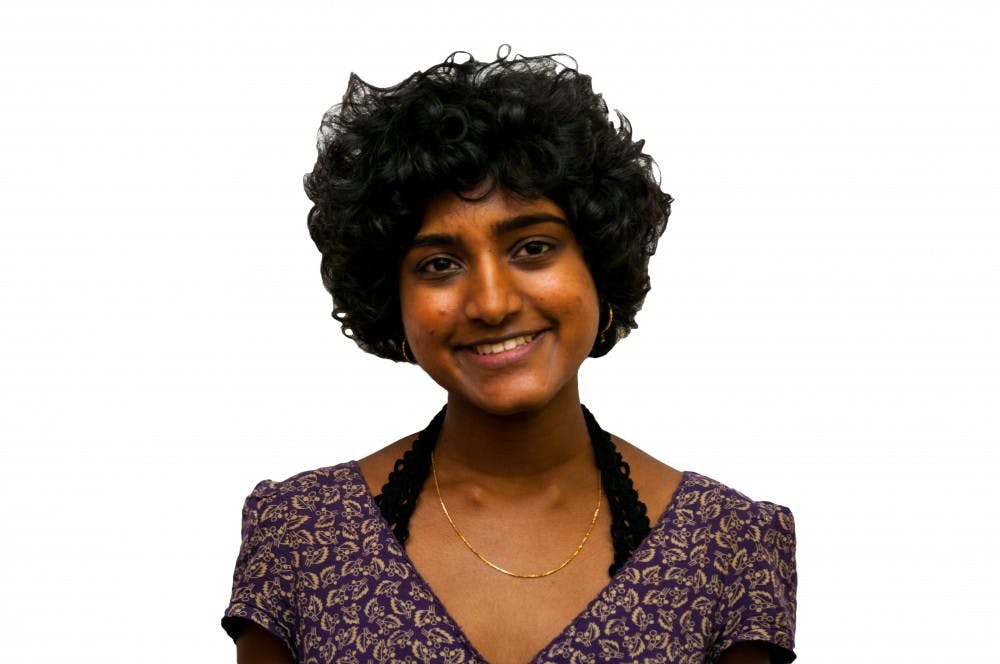“Are you going home for Thanksgiving?” This is the question I’ve gotten the most over the past month. Before this year, yes, I did go home (pre-Thanksgiving flights to Texas, unfortunately, have only gotten more expensive with time). But though I’ve been home every year of my life for Thanksgiving Day, I have never been privy to a real Thanksgiving.
My nuclear family is vegetarian, and nobody except me likes pumpkin-containing desserts — two facts that would complicate matters very slightly in any household attempting a traditional Thanksgiving. I used to joke that we’d treat a pineapple as our turkey, slicing it up and baking it for our “Thanksgiving lunch.” The truth is, though, that there was never any such meal — nothing you’d term a “Thanksgiving meal,” anyway. Sometimes we’d make jalapeno cornbread as a half-hearted nod to the season, but mostly we would carry on with our lives as usual, barely acknowledging the day except to discuss Texas A&M’s Thanksgiving football game.
Of course, it’s not because we’re vegetarian that we don’t know what to do on Thanksgiving Day. As is inevitably said around this time of year, Thanksgiving isn’t all about the food — it’s about family, and also (obviously) about giving thanks, and we could easily have had a Thanksgiving that featured a pineapple as its centerpiece if we were at all serious about the spirit of the tradition. But my nuclear family, aside from being vegetarian and shockingly averse to pumpkin, is composed of two first-generation immigrants from India (my parents) and their two children. It’s hard to treat the day as special when you have no extended family in the United States with whom to reunite and celebrate, and it’s even more difficult when it seems not to apply to you at all.
Like everyone else, I learned the Thanksgiving story over and over again in elementary school. And like many of my peers, I learned somewhat later that this Thanksgiving story lacks a great deal of important context: that when the Pilgrims were weak, the Wampanoag protected them, and that not long after this display of “friendship” (in pursuit of a peace treaty), the English settlers began to raid the villages of those whom they called “savages” and “heathens,” decimating the population. I am never sure if it’s my place to say this, but certainly, we ought to decolonize the way we teach and think about Thanksgiving.
There’s another, less immediate problem with the prevalence of the Thanksgiving myth as it’s taught in schools. This is a problem that ought to be of concern to everyone, but particularly those who come from immigrant families continually confused by the hows and whys of Thanksgiving, and who tend to ignore the holiday (both its more and less palatable sides) altogether. We learn in school that the Pilgrims and their descendants (and those who look like them) are the “real” Americans. We think they’re more “real” because they were “first” — but that idea is a product of the Thanksgiving story’s mythic qualities.
This is a particularly insidious idea in a country so often described as a “melting pot” and a “nation of immigrants.” It erases those who were not immigrants, and makes all subsequent immigrants out to be less fundamentally American. Two boys in my third-grade class claimed to be related to William Bradford, and this was viewed with more awe than was strictly warranted — it was a sort of American pedigree. If we learned the right story, though — one that didn’t place Bradford and his fellow Pilgrims on a pedestal — it wouldn’t be much more significant than a student saying they could trace their ancestry back to anyone else remotely well-known.
While the story of Thanksgiving is a mess, the cultural values underlying it — a day of family, of gratitude for a literal or metaphorical harvest — are worth celebrating. We know they’re worth celebrating because most cultures have at least one harvest festival that amounts to “giving thanks.” My parents’ families in India, for instance, celebrated two different versions of Pongal, the major South Indian harvest festival. Pongal is far, far more relevant to my family than the American idea of Thanksgiving. But because of how ingrained the Thanksgiving story is in our culture, as long as I don’t celebrate Thanksgiving, I’m still (to some degree) the "Other."
We should correct the way we see Thanksgiving, and tell the most factual story of the holiday that we can — most of us know this. But we should also recognize that Thanksgiving (not unlike Christmas) is a festival important to certain groups of Americans, and less important to others. Celebrating Thanksgiving the “right way” shouldn’t be a litmus test for American-ness. At the end of the day, it’s just another harvest festival.
SHILPA SARAVANAN is a College junior from College Station, Texas, studying linguistics. Her email address is shilpasa@sas.upenn.edu. “Phone Home” usually appears every Thursday.
The Daily Pennsylvanian is an independent, student-run newspaper. Please consider making a donation to support the coverage that shapes the University. Your generosity ensures a future of strong journalism at Penn.
Donate








